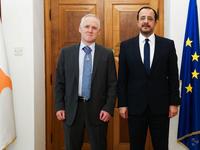Press Releases

06-11-2018 20:21
Opening speech by the President of the Republic, Mr Nicos Anastasiades, at the press conference on his proposal on decentralisation
Ladies and Gentlemen,
I would like to thank you for accepting my invitation; an invitation aimed at directly informing the people about some of my concerns. And I am sure that every citizen shares these concerns, as they have to do with the present, but especially the future of our country.
I will try to be completely comprehensible, avoiding scientific analyses or legal considerations that sometimes just cause confusion.
It is well known that since February 1977 we have accepted a painful but historic compromise, on the basis of which the future status of the Cyprus State will change into a bi-zonal, bi-communal Federation.
Since then, all six of my predecessors have made tireless efforts in order to reach a solution that, without ignoring the concerns of the Turkish Cypriots, would also safeguard the reasonable expectations of the Greek Cypriots, by pursuing a solution with, firstly, a strong central Government to safeguard the unity of the State, the people, the economy and the institutions.
Secondly: Full respect for the human rights and fundamental freedoms of all the legitimate residents of the island, namely freedom of movement, settlement, exercise of a profession and the acquisition of property.
Thirdly: Fair territorial adjustments.
Fourthly and most importantly: the withdrawal of occupying troops from Cyprus.
In all these decades of negotiations, elected as Presidents of the Republic were representatives of all schools of thought regarding the Cyprus issue, whether these were characterised as assertive or realistic.
Despite the above, any attempts failed not as a result of lack of will, but as a result of the Turkish intransigence.
The culmination of the efforts was the 2004 referendum, where the people rejected the proposed plan by a 76% due to intense concerns raised by its provisions.
Since then, there has been a series of rounds of talks with moderate Turkish Cypriot politicians, such as Mr Talat or Mr Akinci today.
During the negotiations, I must confess that progress has been recorded on some of the issues, but significant differences have also remained that have not allowed the attainment of a solution that would lead to a functioning, viable and fully independent and sovereign State.
A normal State, as the UN Secretary-General himself rightly pointed out.
Let me note that for decades the talks had been mainly focusing on the internal aspects, always leaving for the end the issues of Guarantees, the withdrawal of troops and the territorial adjustments.
Since I was elected to the Presidency of the Republic, in order to have an effective negotiation with a prospect of a solution, we set as objectives:
Firstly: Turkey's involvement in the dialogue so as to discuss the international aspect of the Cyprus problem, which is no other than the termination of the anachronistic system of guarantees and intervention rights and the withdrawal of all occupation troops.
Secondly: The involvement of the EU, so that the solution being discussed would fully comply with the acquis communautaire and our obligations as an EU member state.
Thirdly: As regards the internal aspects,
(a) A functional system of governance.
(b) Such territorial adjustments that would allow for the return and settlement of as many as possible refugees to the Greek Cypriot constituent state.
As a result of the intensive negotiations, especially after the designation of Mr Akıncı as leader of the Turkish Cypriot community, we were led in January of 2017 to the first Conference for Cyprus, in which:
For the first time maps were tabled on the territorial adjustments with minimal divergence regarding the percentage of the territory to be returned.
For the first time Turkey was officially involved in a direct dialogue and negotiations on the chapter of Security.
That was not a random thing. It was the result of an Agreement that I had achieved with the Prime Minister of Great Britain, Mr David Cameron, in January 2014, according to which Britain was abdicating its right as guarantor power, if this was the request of the two communities. Greece’s position was well known. Turkey was the only one insisting upon the status of a guarantor country.
For the first time the EU was represented in the negotiations at the highest level.
Unfortunately, due to the intransigence of the Turkish side, the second Conference on Cyprus at Crans-Montana had also not yielded the desirable outcome, and this was due to the intransigence again and also the lack of proper preparation.
Regardless, it cannot be ignored that at the Crans-Montana Conference, the Secretary-General, through the outline of the six points, inter alia, acknowledged the need for:
(a) The termination of the Guarantees and intervention rights from day one.
(b) A considerable reduction of occupation troops from day one and provisions that could lead to the definite termination of their presence.
(c) Such territorial adjustments that satisfy the reasonable expectations of the Greek Cypriot side.
(d) Whereas, one of the significant elements he pointed out with regard to the proper functioning of the State, was the demand by the Turkish Cypriot side for effective participation, noting that the issue should be discussed further in relation to the one positive vote matter, and specifically, when and under what circumstances and in which Bodies it could be exercised, with simultaneous provisions for deadlock-breaking mechanisms.
At this point I would like to clarify for those who might be questioning my intentions vis-à-vis the Secretary-General’s framework, that I would be have to be demented to reject what the Greek Cypriot side has been claiming all along; claims that the Secretary-General’s outline has now set on the daily agenda of the negotiations.
Since then, I have made it clear that my intention is to engage in a dialogue that would carry on from where it was interrupted at Crans-Montana, provided that a new Conference would be well-prepared so that it doesn’t lead us to a new catastrophic impasse.
The aforementioned proposal had also been questioned or interpreted by some people in Cyprus as a precondition. And I feel pleased because the Secretary-General, in his recent report, fully adopts my position.
Based on the experience I have gained from the negotiations, I have ascertained that the Turkish Cypriot community is governed by a grave concern that the Greek Cypriot side, as the community that has majority, will abuse power with the risk of the Turkish Cypriots being marginalized.
To address their concerns, they put forward the demand for one positive vote in every decision made by an assigned body of the Central State, be it either the Council of Ministers or other institutional bodies.
At the same time, the Greek Cypriots have reasonable concerns that such a right by the Turkish Cypriots would possibly lead to a dysfunctional state, with a visible risk of collapse of the new state of affairs. This causes insecurity for the future, in relation to the stability and certainty that they are experiencing today.
An insecurity compounded by Turkey’s claim that the anachronistic system of guarantees and intervention rights and the permanent presence of Turkish troops should remain in place.
This claim by Turkey creates associations regarding the continuation of the Turkish Cypriots’ dependence upon Turkey and consequently, the control of the Federal Republic of Cyprus by that country.
After serious thinking and in order to eliminate the concerns of both communities, but also to achieve a functional and viable solution, I submitted before the National Council, as food for thought, the proposal for decentralization; and I would like to underline this, the decentralization of the powers that have to do with the everyday life of the citizens and/or others who would not allow for the following to be called into question:
(a) The one and single international personality, sovereignty and citizenship of the State.
(b) The unity of the territory, the people, the economy and the natural wealth.
(c) The defence and security, but also the guarding of the Federal State’s borders.
(d) The exclusive and effective representation and participation of the Federal State in the EU, the UN and the rest of the international organizations.
(e) And whatever other powers are deemed as absolutely necessary.
I would like to clarify once more: the decentralization of powers is different to a loose federation, which refers to other systems of governance.
My proposal is not new at all; I submitted a similar proposal to the National Council in April of 2010.
The idea behind it is the greater administrative autonomy of the two states, under the conditions that have been previously mentioned, with the positive vote by the Turkish Cypriots being exercised as a balancing offset only when a decision by an executive body can negatively affect the vital interests of the Turkish Cypriot community and provided, of course, that an effective mechanism will be institutionalized for resolving any emerging disputes.
This fully complies also with the reference by the Secretary-General of the United Nations for the adjustment of the effective participation of the Turkish Cypriots, securing, at the same time, the proper functioning of the State.
It is my view that greater administrative autonomy creates a feeling of security among the Turkish Cypriots, takes away the persistence upon a positive vote for all the decisions, and also refutes Turkey’s pretexts for the continuation of guarantor and intervention rights for the protection, supposedly, of the Turkish Cypriots from arbitrary decisions by the Greek Cypriots.
At the same time, it addresses the concerns of the Greek Cypriots regarding the functionality and viability of the State, confronting the feeling of insecurity due to the risk that the new state of affairs might collapse.
At this point, I would like to repeat what I had mentioned in my 2010 memo to the National Council:
“We consider that the over-concentration of powers to the central state, instead of strengthening the entity, will multiply the risk of frictions, impasses and paralysis, while it will put the functioning and viability of the State in danger.
It is self-evident that such phenomena will have direct consequences to the everyday life and prosperity of the citizens, resulting in the reinforcement of the powers that would prefer secession or the creation of two states.
For all the above reasons we believe that excessive powers in matters of internal governance could remain to the states…..In conclusion, over-concentration of powers to the central state….. will be, in my opinion, a cause for either the rejection of a possible new solution or the speedy collapse of the state with devastating and immeasurable consequences.”
I would like to stress and reiterate that my proposal is food for thought so as to lift the concerns of the two communities, in order to create the conditions for the resumption of a productive dialogue that will lead us, this time, to the attainment of a solution to the Cyprus problem and not to a destructive impasse, with the danger of being faced with choices that we clearly reject.
I would like to make it clear that as a responsible leader I cannot ignore the dangers in prolonging the impasse; This is why I do not remain idle. But, at the same time, I cannot accept a solution that will lead us to dysfunctional State.
Ignoring reasonable concerns might lead to an Agreement between leaders, but, at the same time, it will lead to the contempt of the leaders with a second and definitively destructive rejection by the people, and this is something that I do not wish for nor will I ever strive for.
Everyone has the right to express his/her opinion and to disagree with my handlings or even ignore the fact that the current impasse is due to the intransigence of the Turkish and the Turkish Cypriot side. But what I will never accept is the questioning of the sincerity of my efforts for the resumption of a dialogue that could lead us to a viable solution.
Forty-four years after the invasion and after numerous rounds of fruitless negotiations, the least we ought to do is be concerned with how to break the deadlock. With how we can reach a solution that will alleviate the reasonable concerns of both communities.
The easy solution for me, if I had other things in mind, would be to conveniently engage in yet another round of negotiations that would result in yet another impasse.
A responsible leader does not make decisions either to be likeable or to avoid criticism.
I would like to stress that I fully understand the concerns being expressed by various schools of thought. We must all however take into consideration the negative faits accomplis created by a prolonged deadlock, as well as the visible dangers from reaching a dysfunctional solution that will lead to equally destructive results.
For this I call on the leaders of the political powers, through an undogmatic and productive dialogue, to jointly form common positions that will allow us to engage in a new round of negotiations that will lead us to a solution that is acceptable by both communities.
*** For the opening speech by the President of the Republic, Mr Nicos Anastasiades, in Turkish click here.
(AM, MKA, EL)
Relevant Press Releases







